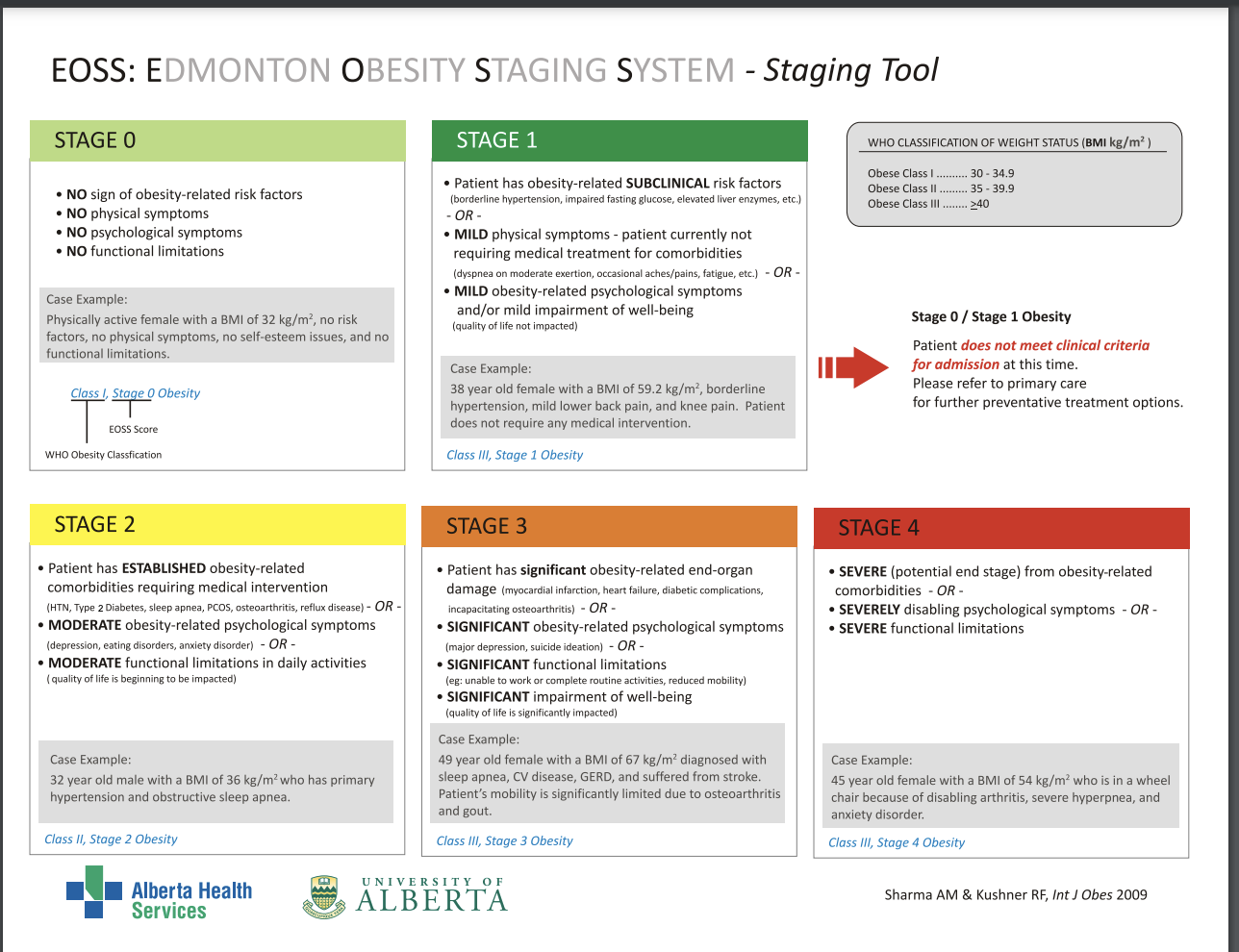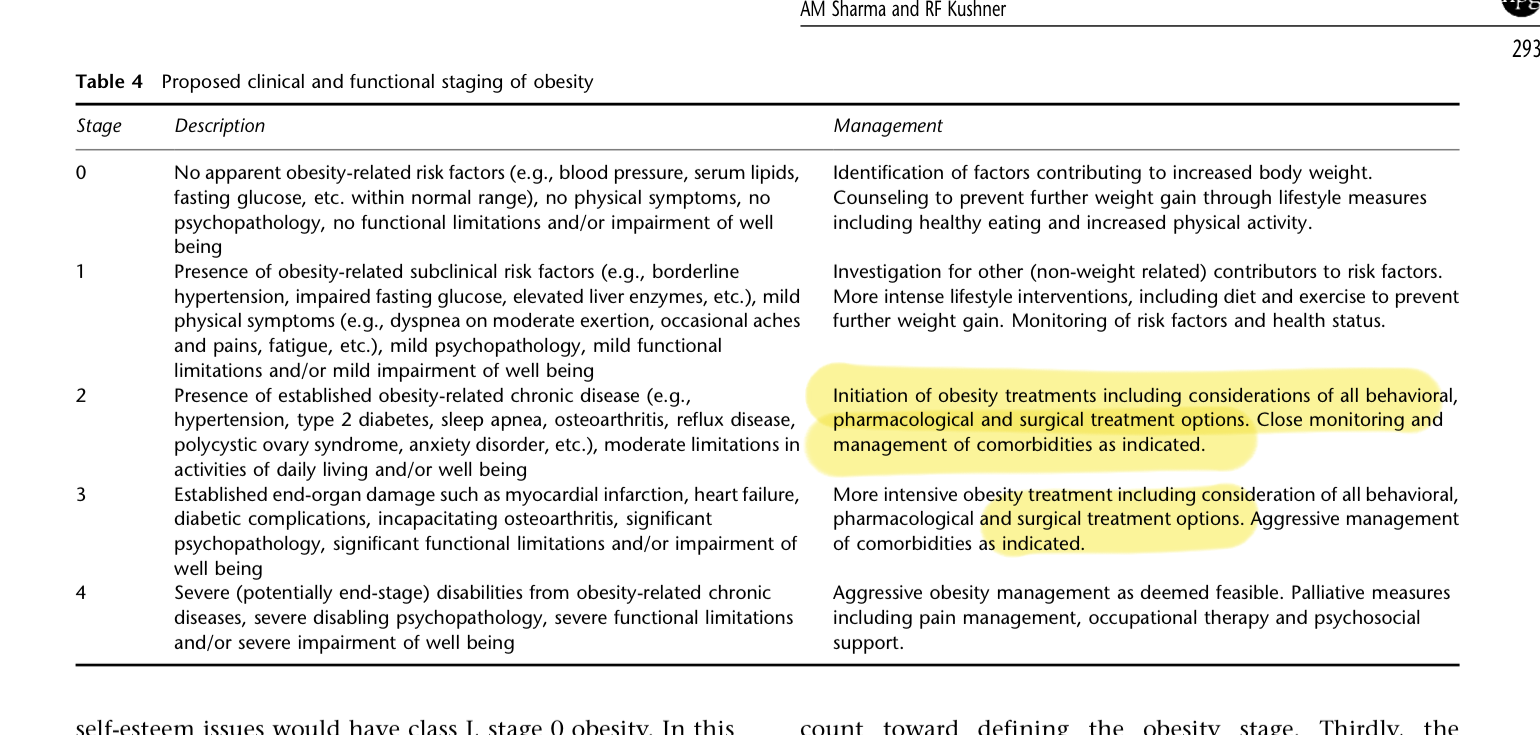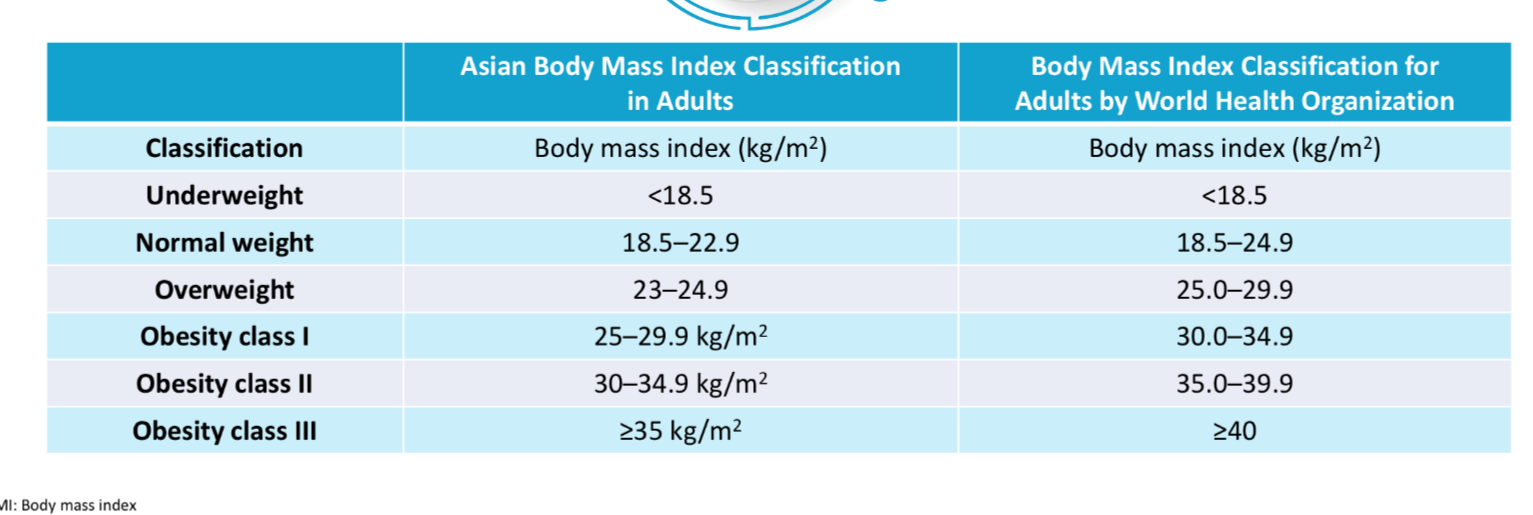- Credits
- Section Writer: Dr. Om J Lakhani
- Section Editor: Dr. Om J Lakhani
Support us:
- Support us by purchasing our book - Click here for more details: Volume 1- THE BEST OF NOTES IN ENDOCRINOLOGY BOOK SERIES
- Support you by Becoming a YouTube member (Click here)
- Q. Give the cutoff for obesity in Adults?
- Normal weight - BMI 18.5 to 24.9 kg/m2
- Overweight - BMI ≥25 to 29.9 kg/m2
- Obesity - BMI of ≥ 30 kg/m2
- Severe obesity - BMI ≥ 40 kg/m2 (or ≥35 kg/m in the presence of comorbidities)
- Q. What is the cutoff for Asians?
- Overweight- 23-24.9 kg/m2
- Obesity - >25 kg/m2
- Typically use 2.5 kg/m2 lower than Western data above
- Q. Enlist the Broad Etiologies of obesity.
- Lifestyle factors
- Diet factors
- Drugs
- Genetic caused
- Infection
- Endocrine causes
- Perinatal and postnatal life changes
- **Age and obesity **
- Q. Enlist how various life stages are associated with obesity.
- Antenatal factors are associated with obesity
- SGA and rapid catch-up growth and obesity
- Formula feeding and obesity
- Childhood/ adolescent obesity
- Pregnancy weight gain
- Menopause
- Weight gain in males after the 30s
- Q. What are the antenatal risk factors for obesity?
- Excess maternal weight gain
- Excess prepregnancy weight in the mother
- Diabetes in pregnancy
- Smoking during pregnancy
- Exposure to Endocrine disruptors
- Q. What are the risk factors at birth?
- SGA – higher risk of obesity
- Breastfeeding – protects from obesity
- Q. Is birth weight associated with obesity in later life?
- Poor correlation with higher weight
- More risk with SGA
- Q. Is obesity In childhood/adolescence associated with obesity in later life?
- Yes
- Q. When do most women gain excess weight?
- After puberty
- Q. Does pregnancy and pregnancy weight produce obesity in women?
- Normal weight gain in pregnancy – lost post pregnancy
- Excess weight gain in pregnancy Retained
- Q. What is the normal weight gain in pregnancy?
- 11.5- 16 kg
- Q. Do OC pills cause weight gain?
- It is conventionally thought, however, data does not back it
- Q. Is weight gain seen in menopause?
- Early post-menopausal period is associated with weight gain and fat redistribution
- Q. Does estrogen therapy prevent weight gain after menopause?
- No
- It only prevents fat redistribution
- Q. When do men become obese?
- Obesity starts in the late 20s and 30s
- Continues to 60s
- Then declines
- **Lifestyle measures and obesity **
- Q. Enlist the lifestyle measures associated with obesity.
- Sedentary lifestyle
- Sleep deprivation
- Smoking cessation
- Q. Which sedentary behavior is most strongly associated with obesity?
- TV watching
- Every 2 hours spent watching TV is associated with a 23% increase risk of obesity and a 14% increase risk of diabetes
- Q. What is the relation between sleep and obesity?
- Sleep restriction (and not sleep lengthening) is associated with obesity
- Sleep restriction is also associated with reduced leptin and increased Ghrelin leading to increased food intake
- Q. How much weight gain is seen after smoking cessation?
- 1-2 kg in the first 2 weeks
- 2-3 kg in the next 4-5 months
- **Dietary and obesity **
- Q. Enlist the relationship between diet and obesity.
- The calorie content of the meal
- Composition of meals
- Frequency of meals
- Timing of meals
- Nighttime eating syndrome
- Binge eating
- Restrained eating
- Q. What is restrained eating?
- Many people have conscious control over their food intake
- This is called restrained eating
- This reduces obesity risk
- Q. What is night eating syndrome?
- It is the intake of more than 25-50% of calories of the day between the last meal and breakfast
- This typically leads to obesity
- Q. What is Binge eating?
- It is a psychiatric disturbance
- There is excess eating in single sessions especially at evening/nighttime
- **Drugs and obesity **
- Q. Which antipsychotics cause weight gain?
- Clozapine and olanzapine are notorious for weight gain
- Followed by Risperidone
- Q. What is the relation between TCA and weight gain?
- TCA causes weight gain
- Q. What is the relation between SSRI and weight gain?
- It is complex
- Paroxetine – weight gain
- Sertraline and Fluoxetine – short-term causes weight loss, long term may cause neutral/ mild weight gain
- Q. Which antidepressant produces weight loss?
- Buproprion
- Q. Which antiepileptics cause weight gain and which cause weight loss?
- Weight gain Carbamazepine and valproate
- Weight loss- Topiramate, Zonisamide
- Q. What type of insulin therapy produces more weight gain?
- Intensive insulin therapy more weight gain compared to conventional insulin therapy
- Q. Which antihypertensive causes weight gain?
- Beta-blockers
- Q. Name some other important drugs which cause weight gain?
- Cyproheptadine
- Glucocorticoids
- Neuroendocrine causes of obesity
- Q. Enlist the endocrine causes of obesity.
- Hypothalamic obesity
- Cushing’s syndrome
- PCOS
- Hypogonadism
- Pseudohypoparathyroidism
- GH deficiency
- Q. What is the cause of obesity in Cushing’s syndrome?
- Increase glucocorticoids increase 11 beta HSD1 in visceral tissue → increase lipogenesis → increase obesity
- Q. Is hypothyroidism associated with obesity?
- Mild weight gain is common in hypothyroidism
- However, it is in the tune of 1-2 kg
- Q. Does treatment of Subclinical hypothyroidism produce weight gain?
- No
- **Other etiologies **
- Q. What is seasonal affective disorder?
- People living far north develop depression during winter because of lack of sunlight exposure
- This is a seasonal affective disorder
- This can be corrected by exposure to light
- This may be related to obesity
- Can be treated with SSRI
- Q. Which viral infection has been linked with obesity?
- Adenovirus infection
- Q. What is the EOSS score?
- This is the Edmonton Obesity staging system
- Q. Why is there a need for an EOSS score when we have BMI?
- This is because BMI correlates poorly with some of the health outcomes
- EOSS score takes more factors into consideration beyond BMI
- For the same BMI- different patients may have different EOSS scores and hence different outcomes
- Q. Give the outline for the EOSS staging system.
- Q. Give the EOSS staging in simple terms.
- 0 - No comorbidities or distress due to obesity
- 1- Mild preclinical morbidities due to obesity
- Borderline hypertension
- Aches and pain
- Impaired fasting glucose
- 2- Established comorbidities
- Hypertension
- Diabetes
- OSA
-
-
- End organ damage
- Myocardial infarction
- Stroke
-
-
- Severe obesity-related issues
- Q. How does one define an EOSS score?
- So you say Class I, Stage 0 Obesity - which means a class I based on BMI and stage 0 based on EOSS score
- Q. What treatment would you propose at what stage of obesity?
- Stage 0 and 1 - lifestyle measures (LSM)
- Stage 2- LSM and Pharmacological therapy
- Stage 3-4 - LSM, Pharmacotherapy, and surgery
#update - 22-Jan-2023
- Q. Please tell us the India centric classification for Obesity ?
- Q. What does the current AACE consensus say about the South Asians in terms of obesity classification ?
- Q. How does this compare with the rest of the world ?
- Q. According to Indian consensus statement , when should pharmacotherapy for obesity be started ?
- 1.The pharmacotherapy should be initiated for BMI above 27 kg/m2 without co-morbidity, or a BMI above 25 kg/ m2 with co-morbidity.
- 2.The cut-offs for WC for initiating pharmacotherapy was unanimously agreed upon as a WC measurement 10 cms more than the upper limit of gender specific normal value for adult Asian Indians.




